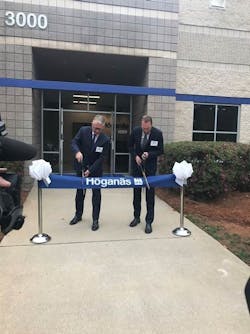Höganäs opens cutting-edge environmental technology lab in U.S.
CARY, NC, OCT 6, 2017 -- Höganäs, a global research and manufacturing company specializing in advanced metal powders, announced the opening of a new environmental business area office and water treatment laboratory in Cary.
Based in Sweden and with operations around the world, Höganäs is a leader in the development, production and commercial application of metal powders used for a wide range of industrial and environmental purposes. Their products make machine parts more durable and efficient, reduce waste in manufacturing through innovations in 3D printing, and make water and soil cleaner and safer.
Avinash Gore, President of Business Area Environmental at Höganäs AB, said the company selected the Triangle for its new office and lab facilities because of the quality of life, cost of living and the breadth of environmental research taking place in the area. "With premier universities and a wealth of industry-leading R&D in pharmaceuticals, pesticides and other environmental sciences, there is a remarkable pool of talent and expertise here that few areas of the country can match," said Gore, one of 15 people relocating from Johnstown, Pennsylvania, to Cary.
In recent months, Höganäs has been recruiting professionals working in different fields from across North Carolina. Eight new employees have joined the international team at the RTP facility, and further recruitment will follow with plans to hire approximately 100 employees over the next two years.
Höganäs has developed and patented a number of products and processes that apply proprietary metal powder technology to successful and sustainable removal of contaminants from water. Pilot projects for Cleanit® LC and Cleanit® EC in California and Brazil, respectively, have successfully removed Chromium-6, arsenic, metals and other toxins and contaminants from drinking water and wastewater.
Water scarcity is one of the greatest threats facing the planet. Population growth, urbanization and climate change mean demand for clean, safe water will only increase. Höganäs' innovative technologies, designed to remove contaminants from drinking water, industrial wastewater and soil, have the potential to make a significant global impact.
Most recently, Höganäs announced that SKF Brazil has invested in a Cleanit® EC system to treat industrial wastewater. Low operating costs, a high degree of innovation and decreased use of groundwater were some of the deciding factors. Höganäs will roll out additional lighthouse projects in the U.S., India, Brazil, and China over the next few years.
Until recently this cutting-edge research was carried out at North American Höganäs' Johnstown facility. The move to RTP will allow the company to expand the development and application of these processes and systems worldwide.
About Höganäs
Established more than 200 years ago, Höganäs AB is a world leader in metal powder solutions. www.hoganas.com/cleanit
